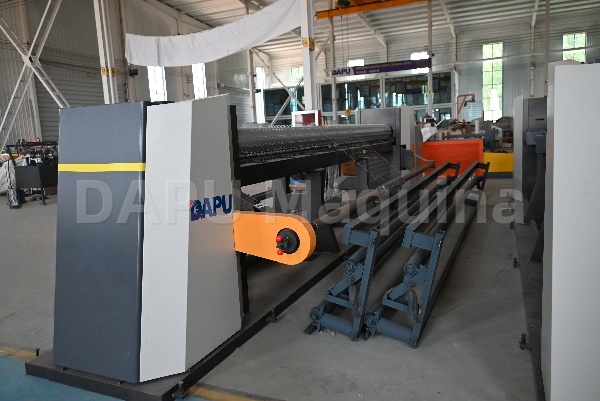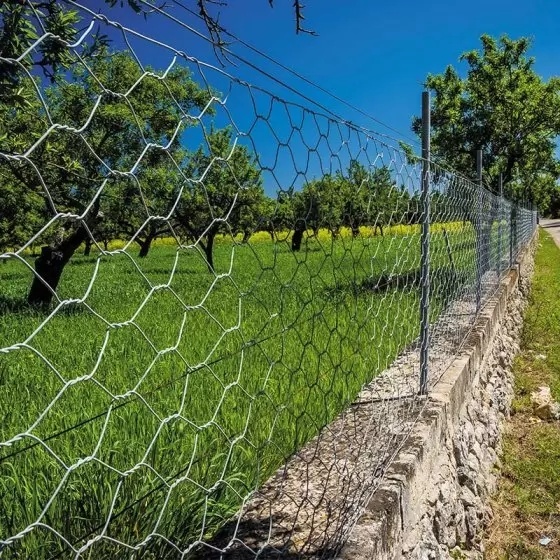
Affordable Hexagonal Mesh Machine for Poultry and Gabion Contractors
Category:Blog
Author:
Source:
Add time:2025-07-16 15:32
Why Hexagonal Mesh Production Is Critical in South Africa
South Africa faces unique challenges in both agriculture and infrastructure. Poultry farming continues to grow, driven by rising local demand for eggs and meat. At the same time, erosion control, riverbank protection, and retaining wall construction are essential for infrastructure projects. In both cases, hexagonal wire mesh is the preferred material due to its flexibility, strength, and cost-efficiency.


But here is the challenge: relying on imported mesh is expensive and often delayed because of shipping issues. Manual production, on the other hand, consumes time, requires skilled labor, and delivers inconsistent quality. For many small and medium-sized businesses, the solution lies in an affordable hexagonal mesh machine that offers precision, speed, and low operational cost.
The Challenges Faced by South African Businesses
Before selecting a machine, it’s important to understand the real-world problems contractors and farmers face:
Labor shortages and high wages: Manual weaving or outsourcing mesh production can drive up costs significantly.
Inconsistent mesh quality: Uneven tension and incorrect mesh sizes can weaken gabion structures or poultry cages.
Logistical delays: Imported mesh comes with high freight charges and unpredictable lead times.
Limited versatility: Some machines only produce one size of mesh, forcing buyers to invest in multiple units.
After-sales support gaps: Many suppliers provide no local service, leaving businesses vulnerable to downtime when a machine needs repair.
A machine that addresses these pain points is not a luxury—it’s a necessity for businesses that want to stay competitive.
What Is a Hexagonal Mesh Machine?
A hexagonal mesh machine is designed to twist and interlock wire into a continuous hexagonal pattern, commonly used for gabions, fencing, and poultry cages. The process combines precision engineering and high-speed automation to create uniform mesh that meets international standards.
Typical features of a modern machine include:
Adjustable mesh sizes for different applications
Support for galvanized or PVC-coated wire
PLC control for ease of operation and minimal manual adjustment
Automatic tension control to prevent mesh deformation
How It Works in Simple Steps
Wire Feeding: Wires are fed from spools into the machine.
Twisting and Interlocking: The machine twists pairs of wires into a hexagonal pattern.
Edge Locking: Automatic edge devices secure the mesh sides.
Cutting and Rolling: Finished mesh is cut to size and rolled for transport.
For poultry farming, smaller apertures (25x30mm, 30x40mm) are preferred, while gabions require larger apertures (60x80mm, 80x100mm) with thicker wire.
Why Affordability Is About More Than Price
When contractors search for an “affordable hexagonal mesh machine,” the focus is often on initial cost. However, true affordability includes:
Durability: A machine that lasts 10+ years saves more in the long run.
Low maintenance costs: Machines should have accessible parts and require minimal downtime.
Energy efficiency: Lower power consumption means reduced operating expenses.
Flexibility: The ability to produce multiple mesh sizes on the same machine eliminates the need for multiple investments.
Introducing DAPU Hexagonal Mesh Machine
For poultry farmers and gabion contractors in South Africa, the DAPU Hexagonal Mesh Machine offers an ideal balance of affordability and advanced features. Here’s why it’s a smart choice:
1. Versatile Production Capability
Wire Diameter: 1.6–3.5 mm
Mesh Sizes: 60x80 mm, 80x100 mm, 100x120 mm (custom sizes available)
Mesh Width: Up to 4300 mm for high-output projects
Speed: Up to 150 m²/h for continuous production
2. Intelligent Control System
Every DAPU machine is equipped with a PLC touchscreen interface, making it easy to monitor production, adjust parameters, and reduce human error. Operators need minimal training to start producing high-quality mesh.
3. Built for South African Conditions
The machine frame is made from heavy-duty steel with an automatic lubrication system to handle long production runs. It is designed to operate in challenging environments without performance loss.
4. Cost-Saving Benefits
Reduced Material Waste: Automatic tension control prevents wire breakage and mesh deformation.
Energy Efficiency: Optimized for low power usage while maintaining speed.
Quick ROI: Most businesses recover the cost within 6–12 months thanks to high productivity.
5. Reliable After-Sales Support
DAPU provides remote technical support, video tutorials, and, when necessary, onsite service in South Africa. Spare parts are available to ensure minimal downtime.
Real-World Applications in South Africa
Poultry Industry: Produce thousands of square meters of predator-proof cages without relying on imports.
Gabion Construction: Build retaining walls, riverbank protection systems, and erosion control structures with locally produced mesh.
Agricultural Fencing: Secure crops and livestock with durable, corrosion-resistant mesh.
By manufacturing mesh in-house, businesses cut costs, shorten lead times, and gain full control over quality.
Why Choose DAPU for Your Business?
Unlike generic machines on the market, DAPU delivers a combination of affordability, advanced technology, and dependable support. Our machines are already used by hundreds of customers worldwide, including Africa, for poultry projects, gabion manufacturing, and infrastructure solutions.
Conclusion
For South African contractors and poultry farmers, investing in an affordable hexagonal mesh machine is no longer optional—it’s the smartest way to stay competitive. With DAPU, you get a machine that balances price, performance, and reliability, ensuring long-term savings and consistent quality.
Ready to take control of your mesh production? Contact DAPU today and request a free quote.
Recommend News




